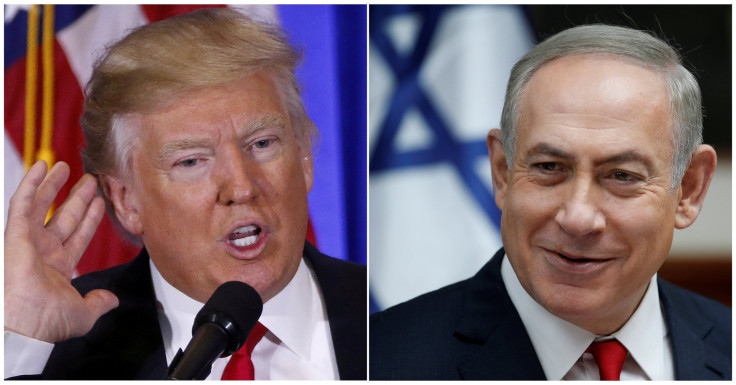US-Israel Relations 2017: Benjamin Netanyahu To Meet Donald Trump In Bid To Improve Ties

Israeli Prime Minister Benjamin Netanyahu will arrive in Washington Tuesday for his first face-to-face meeting with U.S. President Donald Trump.
They have known each other since Netanyahu served as Israel's ambassador to the United Nations in New York in the 1980s and was friendly with the president's father Frederick Trump. However, this will be their first official meeting and Netanyahu hopes — after eight years of often estranged relationship with the former president Barack Obama — that Trump would be a better ally for Israel.
According to Michael Oren, Israel's ambassador to the U.S. for much of Barack Obama's term and currently serving as the deputy minister for diplomacy in the prime minister's office, Netanyahu's priority will be to make sure that both the countries are on good terms, although he also said that it was unrealistic to expect U.S. and Israel to agree completely on all issues.
"The overriding goal will be to restore the relationship so that there are no surprises and no daylight, Oren said. "He'll want to restore the alliance and make sure the U.S. is, above all, standing by Israel and working together with Israel to fight common threats."
On Feb. 12, after a Cabinet discussion about the trip, the Israeli prime minister's office said that the two leaders would discuss Iran, Syria and the Palestinians, and relations with Trump's administration.
"All the ministers agreed on the great importance of tightening the relations with the United States," Netanyahu's office said in a statement, "both on the governmental level and the personal level."
During his campaign, Trump had hinted that after becoming president he would provide staunch support to Netanyahu and his allies in Israel, stating that he would also support Israel's settlement building activity in the West Bank, move the U.S. Embassy to Jerusalem and scrap the Iran nuclear deal.
However, since he took office on Jan. 20, Trump has backed down on several foreign policy issues, which include reaffirming the "one China" policy and vowing "strong support" for the NATO military alliance in Europe, and now he appears to be re-evaluating his Israel policy too.
On Friday, for instance, Trump reportedly said that "going forward with settlements" is not a "good thing for peace" — a statement that puts him far closer to traditional U.S. policy, and to Obama, than before.
Settlements "don't help the [peace] process. I can say that," Trump said. "There is [only] so much land left. And every time you take land for settlements, there is less land left."
And on Sunday, Netanyahu was quoted on Army Radio telling members of his right-wing Likud Party that "to believe there are no restrictions now would be a mistake."
The meeting with Trump on Wednesday would be a key one in determining the direction of American-Israeli relationship — one that was evidently bitter under president Obama's administration due to the continued expansion of settlement in the occupied territory, Israel's vehement opposition to the nuclear deal with Iran and several personality clashes with Netanyahu.
© Copyright IBTimes 2024. All rights reserved.












